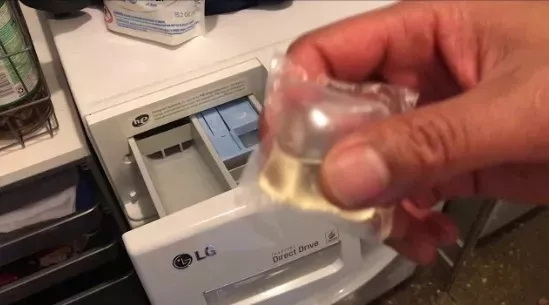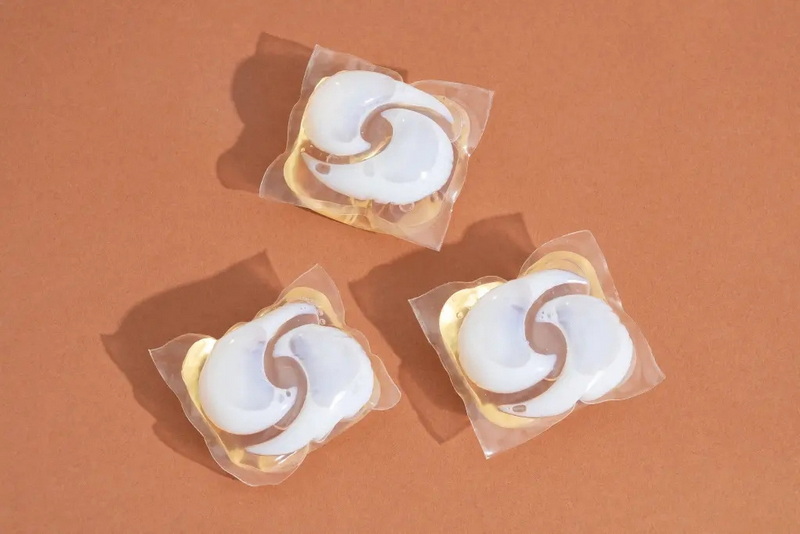Dongguan UFine Daily Chemical Co.,Ltd.
- All
- Product Name
- Product Keyword
- Product Model
- Product Summary
- Product Description
- Multi Field Search
Views: 222 Author: Tomorrow Publish Time: 11-21-2025 Origin: Site











Content Menu
● Where Should Laundry Pods Actually Go?
● What Happens If You Put a Laundry Pod in the Dispenser?
>> 2. Clogged Dispenser Compartments
>> 6. Safety Hazards and Damage Risks
● Why Pods Dissolve Best in the Drum
● What To Do If You Accidentally Put a Pod in the Dispenser
● How to Use Laundry Pods Correctly
● Common Misconceptions About Laundry Pods
● Maintenance After Detergent Mishaps
● Benefits of Using Laundry Pods Correctly
● FAQ
>> 1. Can You Put Laundry Pods in Any Type of Washer?
>> 2. Do Pods Dissolve in Cold Water?
>> 3. Why Did My Laundry Pod Not Dissolve?
>> 4. Can Laundry Pods Clog Washing Machines?
>> 5. How Many Pods Should I Use for a Load?
Laundry pods are a modern convenience designed to make washing clothes easier and more efficient. They contain pre-measured amounts of detergent, sometimes mixed with fabric softener or stain removers. However, some users mistakenly put laundry pods into the washing machine dispenser rather than directly into the drum. Understanding what happens when this occurs can help prevent laundry mistakes, machine damage, and poor cleaning results.
This article explains what happens if you put a laundry pod in the dispenser, why it matters, how to use pods correctly, and what to do if it happens accidentally. By the end, you'll know exactly how to get the best results from your laundry pods.

Laundry pods, also called detergent capsules or packs, are small, sealed packets containing concentrated laundry detergent. Each pod contains a specific dose for one load of laundry. The pod's outer film is made of polyvinyl alcohol (PVA), a water-soluble material that dissolves completely in water during the wash cycle.
Pods are designed for convenience and precision. They prevent overuse of detergent, reduce waste, and save time when measuring. When used correctly, the pod releases detergent evenly, ensuring clean, fresh-smelling clothes after each wash.
Laundry pods are meant to be placed directly in the washing machine drum, not in the detergent dispenser drawer. When placed in the drum, the pod comes into full contact with water, allowing the water-soluble film to dissolve quickly and release its contents effectively.
The detergent drawer is designed for liquid or powdered detergents, which flow through the drawer compartments and into the drum at different stages of the wash cycle. Since a pod is a sealed gel capsule, it cannot pass through this system as intended.
Placing a laundry pod in the detergent dispenser can cause several unwanted issues. These issues affect not only the cleanliness of clothes but also the washing machine's performance over time.
Laundry pods rely on direct water contact to dissolve properly. Inside the dispenser, water flow may be too low or uneven to fully break down the pod's film. As a result, the pod might only partially dissolve, leaving behind sticky residue or undissolved detergent in the dispenser drawers.
When a pod fails to dissolve, it can create blockages inside the dispenser and detergent channel. Over time, these clogs restrict detergent flow during future washes, leading to poor water circulation or detergent buildup inside the drawer assembly.
If the pod does not dissolve properly, detergent may not reach the laundry drum or may enter late in the cycle. Consequently, clothes may finish with patches of residue, streaks, or uneven cleaning — especially in cold-water washes.
Residues left inside the dispenser can solidify, obstructing water jets or pipes. This buildup can interfere with your washer's sensors, valves, or pressure systems. Over the long term, that may require costly cleaning or repairs.
Placing pods in the wrong location wastes detergent since it never dispenses efficiently. You may also need to rewash your clothes, wasting more energy, water, and time.
Pods contain highly concentrated detergent compounds enclosed in a water-soluble film. If placed in the dispenser, the pod might rupture prematurely or leak detergent unpredictably. This can lead to skin irritation, damage to clothing or machine parts, and possibly clog or damage delicate dispenser mechanisms. Such damage might require costly repairs or replacement parts. It also increases the risk of chemical exposure when handling the machine.[2]
The key feature of laundry pods is their dissolvable film. This water-soluble film needs a sufficient amount of water movement and direct exposure to warm or cold water to break down completely.
When a pod is placed in the drum before loading clothes, the tumbling motion ensures it distributes detergent evenly across fibers. This direct action improves cleaning quality and prevents film remnants from sticking to clothes or the washer interior.
Front-loading washers and top-loading machines both require you to place the pod in the bottom of the drum first, before adding laundry. This gives the pod the best chance to dissolve during the initial fill cycle.
Mistakes happen, but they can usually be corrected easily if caught early. Follow these steps if you ever put a pod in the dispenser:
1. Stop the machine immediately before the cycle completes.
2. Open the dispenser and check for an un-dissolved or half-dissolved pod.
3. Remove any residue manually using warm water. Clean the compartment thoroughly with a damp cloth or sponge.
4. Run an empty hot-water cycle with no detergent to clear remaining film or detergent particles.
5. Rewash your clothes with a new pod correctly placed in the drum.
If detergent buildup continues after multiple washes, the dispenser drawer may need removal and cleaning with warm water and mild soap to prevent damage and ensure proper detergent flow.[2]

To get the best cleaning performance and avoid residue issues, always follow these tips when using laundry pods:
- Place the pod directly in the empty drum before adding clothes.
- Use one pod for regular loads and two pods for heavily soiled or large loads.
- Store pods in a dry, cool place away from moisture and sunlight.
- Keep out of reach of children and pets, as the colorful pods may look like candy and pose serious poisoning risks if ingested.
- Use the recommended water temperature listed on the packaging for proper dissolution.
Always read the manufacturer's label to ensure compatibility with your washing machine and water conditions. Proper pod handling is crucial for safety, especially since detergent pods can cause skin burns, eye irritation, and serious health hazards if misused or accessed by children.[1][4]
Many users believe pods can dissolve anywhere in the washing machine because of their water-soluble design. However, water flow distribution inside modern washing machines is not uniform. The dispenser receives limited water at low pressure—primarily enough for powders and liquids—but not enough to break down a pod film fully.
Some people try placing pods in the dispenser to “control detergent release,” yet this only reduces cleaning effectiveness. Laundry pods are pre-engineered to work best when placed before loading, providing timed detergent release as water fills and heats during washing.
If detergent residues or foam buildup persist after improper pod use, routine maintenance can help restore your washer's efficiency:
- Remove and rinse the detergent drawer weekly under warm water.
- Run a maintenance wash (empty cycle at high temperature) once a month.
- Wipe the rubber door seal and inner drum regularly to prevent buildup.
- Clean the drain filter periodically if your machine model includes one.
Consistent maintenance eliminates leftover detergent, mold potential, and odor issues, ensuring your washer lasts longer and performs better.
When used properly, laundry pods provide several benefits:
- Convenience: No need to measure or handle messy liquid detergent.
- Efficiency: Delivers exactly the right dose per load.
- Performance: Ensures even detergent distribution across all fabrics.
- Space-saving: Compact and easy to store in small laundry areas.
- Sustainability: Reduces waste by eliminating detergent overuse.
These advantages make pods a preferred choice for households looking for simplicity and reliability in everyday laundry care.
Placing a laundry pod in the dispenser drawer instead of the drum prevents it from working as designed. The pod may fail to dissolve completely, clog the dispenser, leave detergent stains on clothes, or damage the machine. Additionally, such misuse increases the risk of leaks that can irritate skin or damage components. To use pods correctly, always place them directly in the washing drum before loading your laundry. Proper use ensures cleaner clothes, longer machine lifespan, and more consistent washing performance, while minimizing safety hazards.

Laundry pods work in both front-loading and top-loading machines. Just ensure the pod goes inside the drum before adding clothes, never into the dispenser.
Most modern pods are formulated to dissolve in all water temperatures, but warm or hot water generally ensures quicker, complete dissolution.
If the washer was overloaded or the pod was trapped between clothes, water contact may have been reduced. Always load clothes loosely for even distribution.
Yes. If used incorrectly in the dispenser, pods can cause residue accumulation and block internal channels or hoses over time.
For a normal load, one pod is sufficient. For extra-large or heavily soiled loads, two pods may be needed according to product instructions.
[1](https://www.texaschildrens.org/content/wellness/dangers-consuming-laundry-detergent-pods)
[2](https://www.ufinechem.com/can-laundry-pods-be-put-in-liquid-dispenser-of-washer.html)
[3](https://uihc.org/childrens/health-topics/detergent-pod-safety)
[4](https://pmc.ncbi.nlm.nih.gov/articles/PMC7726599/)
[5](https://www.consumerreports.org/cro/magazine/2015/07/the-problem-with-laundry-detergent-pods/index.htm)
[6](https://stppgroup.com/the-science-and-safety-of-laundry-detergent-pods-a-comprehensive-guide/)
[7](https://www.nationwidechildrens.org/research/areas-of-research/center-for-injury-research-and-policy/injury-topics/home-safety/laundry-pods)
[8](https://www.cpsc.gov/content/cpsc-and-accc-warn-of-poison-dangers-with-liquid-laundry-packets)
[9](https://www.cleaninginstitute.org/industry-priorities/outreach/packets/liquid-laundry-packet-safety-tips)
[10](https://pmc.ncbi.nlm.nih.gov/articles/PMC11238368/)